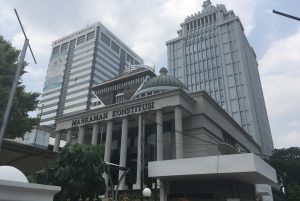Indonesia’s Constitutional Court has rejected a challenge to its contentious ruling that paved the way for the son of President Joko “Jokowi” Widodo to run as a vice-presidential candidate in the upcoming general election.
As BenarNews reported, the eight-judge panel unanimously dismissed the petition, which argued that the court’s original ruling violated the Indonesian constitution. “The petition is rejected in its entirety,” Chief Justice Suhartoyo said, reading out the verdict in Wednesday’s decision.
The Constitutional Court ruling, which was handed down on October 16, created an exception to the legal minimum age of 40 for presidential and vice-presidential candidates, allowing younger officials who have held elected office at lower levels of government to run.
This was widely viewed as a carve-out for Jokowi’s 36-year-old son, Gibran Rakabuming Raka, who was subsequently announced as the running-mate of Defense Minister Prabowo Subianto. Since 2020, Gibran has served as mayor of Surakarta in Central Java, a post once held by his father.
The ruling prompted criticisms that Jokowi was using the power of his office to establish a political dynasty and ensure the continuity of his power after his second and final term comes to an end in October 2024. (Jokowi has denied having any such designs.)
For critics, the sense of favoritism was only underscored by the fact that the then Chief Justice, Anwar Usman, is Jokowi’s brother-in-law (and Gibran’s uncle). The petition that led to the October 16 ruling was also filed by the youth-oriented Indonesian Solidarity Party (PSI), which later appointed Jokowi’s second son Kaesang Pangarep as its chairperson.
Indonesian activists and legal experts subsequently filed a number of complaints with the Court, effectively accusing its nine judges of issuing a politically motivated ruling designed to benefit Jokowi’s son. On November 7, an ethics board at the court dismissed Anwar from his position for a “serious violation” of professional ethics, in refusing to recuse himself from the case.
However, the October 16 ruling was allowed to stand, with Jimly Asshiddiqie, the chief of the ethics panel, arguing that it did not have the authority to overturn it.
As yesterday’s verdict makes clear, subsequent attempts to challenge the ruling have fallen short. The petition, which was filed by a student at Nahdlatul Ulama University, argued that exceptions to the minimum age requirement should be granted only to those who have served or are serving as governors and deputy governors, rather than mayors.
It is perhaps unsurprising that this was rejected, given the seemingly arbitrary line that the petitioner drew between the heads of provinces and heads of cities. In their verdict yesterday, judges stated that any decision to change the law should be left to the legislature – though it is unclear why, if the court had the authority to reinterpret election laws in its ruling last month, why it wouldn’t have the authority to do so again now.
Further petitions are likely to work their way through various legal channels, lawsuits against the General Election Commission. none of which probably stand much chance of success. Given that the official election campaign is now underway, they probably stand little chance of success.
But it is clear that the contentiousness of the Constitutional Court’s role in this election will resonate for some time, especially if Prabowo and Gibran prevail on February 14. The latest public opinion polls show the pair leading the two other rival tickets, led by former Central Java Governor Ganjar Pranowo and Anies Baswedan, the former governor of Jakarta.

































